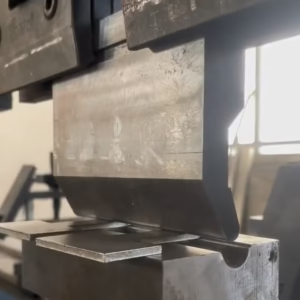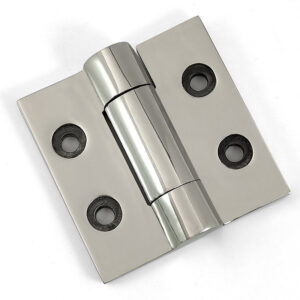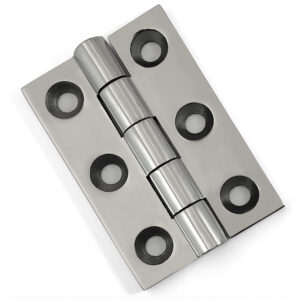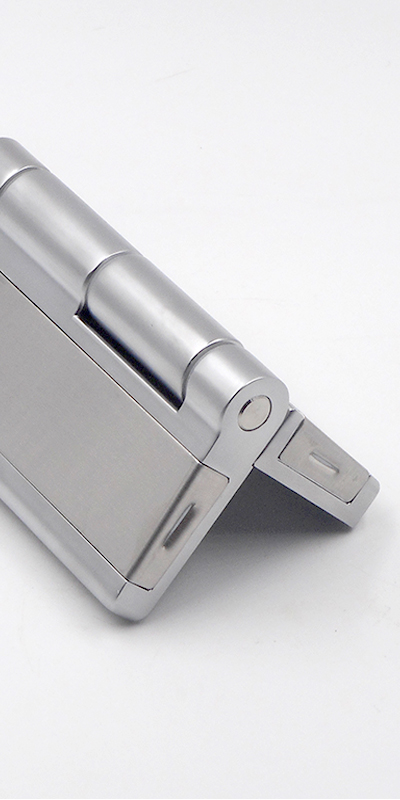Corrosion-resistant hinges are essential for maintaining durability and performance in harsh industrial environments.
Corrosion-resistant hinges are used in industrial equipment to withstand exposure to moisture, chemicals, and extreme temperatures. They prevent rust, reduce maintenance, and ensure long-term functionality in environments such as test chambers, ovens, and heavy-duty enclosures.
These hinges are critical components in industrial design, where failure due to rust can lead to serious equipment downtime or safety risks.
Why Industrial Equipment Needs Corrosion-Resistant Hinges
Corrosion-resistant hinges play a vital role in protecting equipment in environments where water, humidity, or chemicals are present. Equipment such as test chambers, control cabinets, and processing units must maintain airtight seals and structural integrity over time. Regular hinges rust easily, weakening the doors and damaging adjacent components, ultimately requiring frequent replacement.
By contrast, corrosion-resistant hinges ensure reliable, long-term operation under adverse conditions. This makes them particularly useful in industries such as pharmaceuticals, food processing, chemical manufacturing, and any outdoor installations. For example, a climatic test chamber hinge must survive constant shifts in humidity and temperature without compromising its alignment or strength.
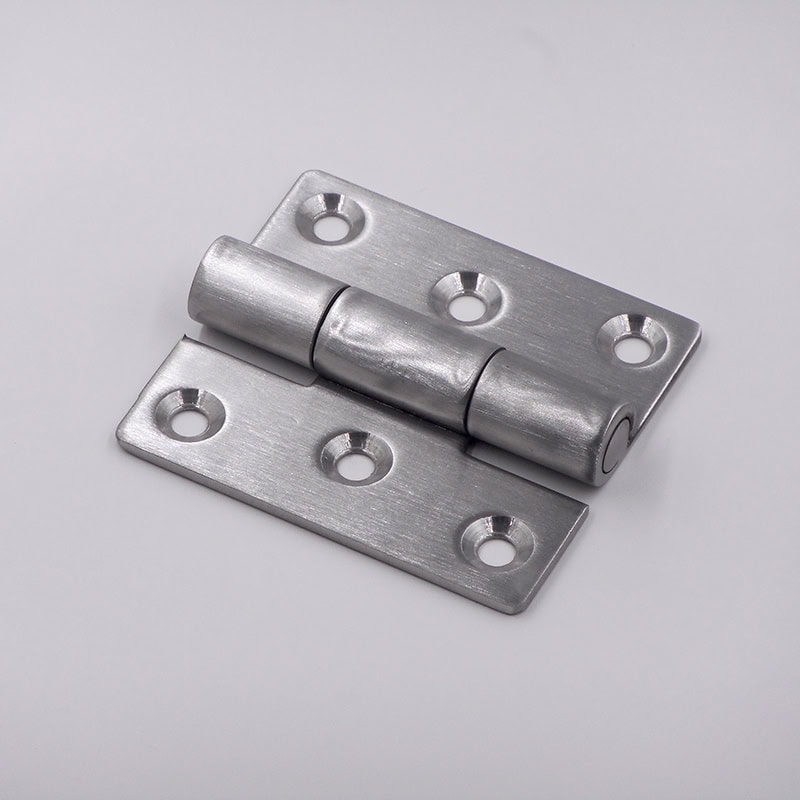
Better Lifecycle Performance and Reduced Downtime
Unlike standard steel hinges, corrosion-resistant versions are made from materials like 304/316 stainless steel or treated aluminum, both of which exhibit strong anti-rust capabilities. This dramatically reduces downtime and maintenance costs.
For heavy doors or equipment that require strong, lasting support, integrating heavy duty hinges with corrosion-resistant features is a must. This type of hardware delivers long-term operational efficiency, even under mechanical stress and chemical exposure.
Stainless Steel Hinges: The Backbone of Corrosion Resistance
Stainless steel is the most commonly used material in corrosion-resistant hinges. Grades like 304 and 316 stainless steel are widely used in industrial applications due to their durability and chemical resistance. While 304 offers good corrosion resistance, 316 is superior due to added molybdenum, making it ideal for marine or chemically harsh settings.
Industrial enclosures, such as those in coastal facilities or food processing plants, benefit greatly from these materials. For example, marine hinges used in dockside control systems require high resistance to salt spray and oxidation. Stainless steel prevents deterioration and ensures hinge function under these tough conditions.
Enhanced Safety and Maintenance Benefits
Hinges that resist corrosion not only improve reliability but also enhance operator safety. Rusted hinges can break unexpectedly, posing injury risks or damaging machinery. Stainless steel hinges reduce these risks, offering peace of mind for operators and reducing liability for manufacturers.
In situations where large, heavy doors are opened frequently—such as on ovens or climate test systems—investing in corrosion-resistant stainless steel hardware improves operational safety and lowers maintenance frequency.
Industrial Applications: Where Are Corrosion-Resistant Hinges Used?
Industrial settings present a variety of environmental challenges that make corrosion-resistant hinges indispensable. These include test chambers, cold storage facilities, outdoor electrical boxes, and processing machines. Any location subject to moisture, chemical splashes, or temperature fluctuation benefits from durable, anti-rust hinges.
For instance, cold storage room hinges are regularly exposed to condensation and sub-zero temperatures, which can rapidly degrade regular hinge materials. Similarly, high-moisture environments like industrial dishwashers or clean rooms require components that won’t oxidize or compromise hygiene.
Examples of Equipment Using Corrosion-Resistant Hinges
-
Climatic test chambers
-
Food processing lines
-
Pharmaceutical clean rooms
-
Electrical enclosures in outdoor facilities
-
Industrial washing systems
-
High-temperature ovens
Corrosion-resistant hinges used in these applications ensure not just functionality but also compliance with hygiene and safety standards.
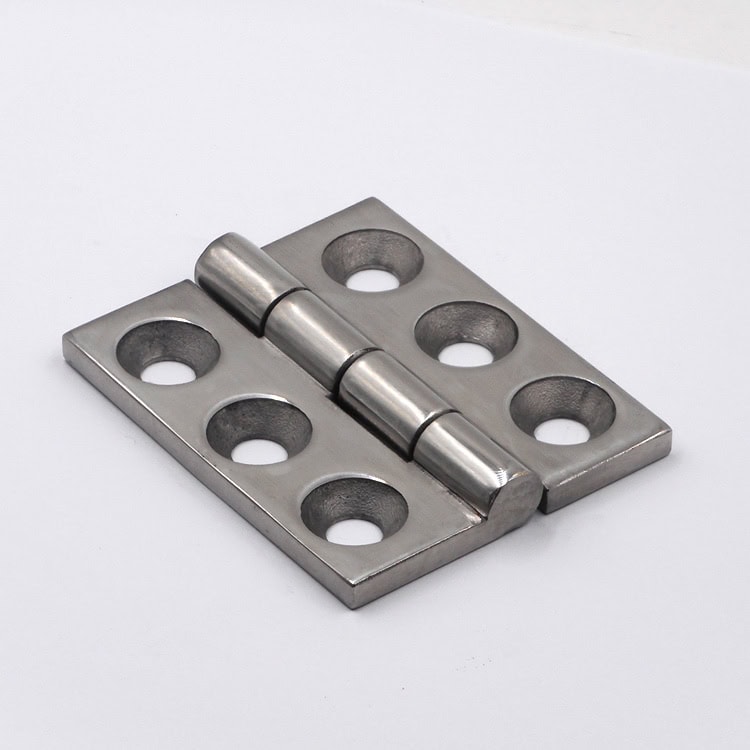
Heavy-Duty Design Enhances Structural Integrity
In addition to resisting rust, corrosion-resistant industrial hinges are often engineered for heavy-duty performance. This includes reinforced leaf thickness, oversized pin construction, and precision-fit tolerances. They are suitable for use on heavy doors or equipment that require frequent, reliable operation.
Weld on hinges, for instance, are often used for industrial access panels and enclosures where a permanent, strong attachment is essential. When made from stainless steel or aluminum with treated coatings, they offer both strength and resistance to oxidation.
Engineering for Harsh Conditions
The mechanical strength of a corrosion-resistant hinge is equally important. In some applications, vibration, door torque, or pressure differentials can place extreme loads on hinge points. A heavy-duty, rust-resistant hinge preserves performance under these conditions.
Use cases include:
-
Autoclave and sterilization machines
-
Power plant control boxes
-
Industrial drying ovens
These hinges ensure not only that doors stay closed securely but also that gaskets remain compressed for sealed environments.
Comparison Between Corrosion-Resistant and Regular Hinges
| Feature | Regular Hinges | Corrosion-Resistant Hinges |
|---|---|---|
| Material | Mild Steel | Stainless Steel / Coated Aluminum |
| Durability | Low in wet/chemical settings | High in extreme environments |
| Maintenance | Frequent lubrication and replacement | Minimal upkeep |
| Cost | Lower upfront | Lower lifecycle cost |
Choosing regular hinges may reduce the initial cost, but the long-term expenses in terms of maintenance, downtime, and replacements far outweigh the savings. Corrosion-resistant hinges, by contrast, offer better value over time.
Real-World Cost Considerations
A company using trailer door hinges in a chemical transport fleet may see hinge failure within months if standard hardware is used. Replacing these with corrosion-resistant variants eliminates repeated repairs, protects cargo, and improves operational continuity.
Importance in Temperature & Humidity Test Chambers
Test chambers designed to simulate various environmental conditions must maintain internal stability and precision. Any leakage due to failing hinges can compromise results. Therefore, hinges that resist both corrosion and deformation are essential.
Climatic test chamber hinges must operate reliably in conditions where temperatures shift rapidly and moisture levels spike. This creates a highly corrosive micro-environment, demanding high-performance hardware.
Sealing and Structural Reliability
When a chamber must hold a precise temperature or pressure, door alignment is crucial. Corroded hinges affect sealing, causing leaks or heat loss. By using high-grade corrosion-resistant hinges, manufacturers ensure consistent performance, accurate testing, and fewer calibration issues.

Role in Industrial Ovens and High-Heat Equipment
Industrial ovens subject hinges to prolonged exposure to elevated temperatures. These conditions can cause softening, warping, or corrosion, especially if humidity or chemical vapors are present.
Corrosion-resistant hinges for high-heat applications are usually made from heat-treated stainless steel or aluminum alloys. Their structure resists deformation even at 200°C or higher, making them ideal for industrial baking, sterilization, or curing processes.
Temperature-Resistant Hardware Solutions
Oven doors are often heavy and used frequently. Using inferior hardware results in rapid wear, mechanical failure, and misalignment. Hinges such as aluminum hinges or specialty coated stainless steel types ensure thermal stability while resisting corrosion from steam or cleaning agents.
For instance, in powder coating ovens, the chemical environment is both hot and reactive. Reliable hinge materials must handle both thermal stress and chemical exposure without failing.
Material Options and Their Corrosion Resistance Levels
| Material Type | Corrosion Resistance | Suitable Applications |
|---|---|---|
| 304 Stainless Steel | High | General industrial enclosures |
| 316 Stainless Steel | Very High | Marine, food, pharma industries |
| Anodized Aluminum | Moderate | Lightweight equipment |
| Galvanized Steel | Moderate | Budget industrial setups |
Material selection depends on the specific industrial environment. Choosing the wrong material can drastically shorten the life of a hinge and compromise equipment performance.
Application-Specific Material Tips
If you need butt hinges for a high-humidity production room, 316 stainless steel is preferred. For lightweight doors in clean environments, anodized aluminum may be sufficient. In outdoor power stations, galvanized coatings can be a cost-effective compromise with adequate protection.
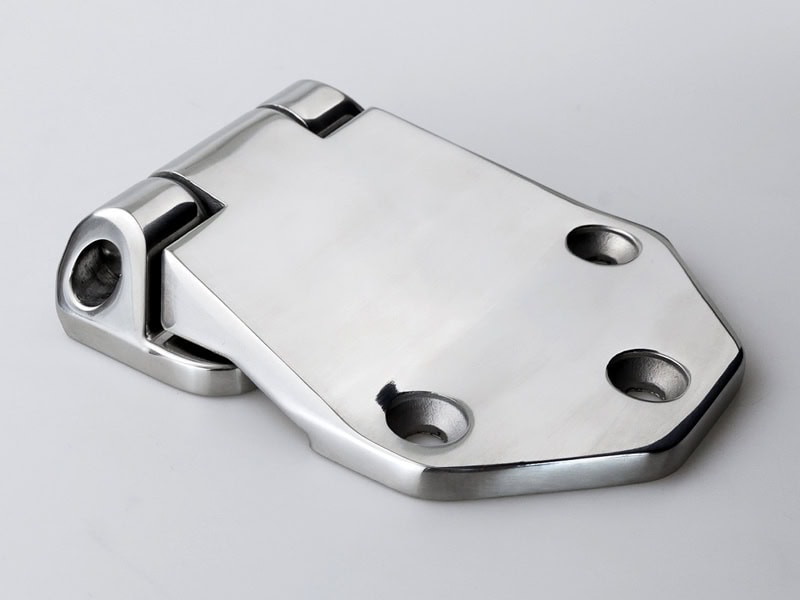
Customization Options for Industrial Use
Industrial applications often require more than just off-the-shelf solutions. Corrosion-resistant hinges can be customized in terms of leaf shape, pin design, mounting method, and material treatments to meet unique operating conditions.
Manufacturers can provide CAD drawings, load analysis, and even 3D models to match exact client specifications. Companies like IHINGES offer custom logo engraving, unique mounting hole patterns, and coating finishes based on the environment.
Specialized Applications
Examples include:
-
Detachable hinges for removable equipment doors
-
Take-apart hinges for maintenance-access panels
-
Special hinges with locking or adjustable angles
Customization not only improves usability but also ensures long-term compatibility with the machinery design.
Long-Term Cost Benefits of Corrosion-Resistant Hinges
While the upfront cost of corrosion-resistant hinges is higher, the long-term savings in maintenance, replacements, and downtime are substantial. They enhance reliability, improve safety, and support lean manufacturing strategies by minimizing unplanned equipment failure.
ROI and Operational Efficiency
A company replacing failing hinges every six months with standard steel parts may save money by switching to longer-lasting stainless or aluminum corrosion-resistant types. Over a 5-year period, this could reduce part costs by up to 40%, not to mention labor and lost productivity.
Conclusion
Corrosion-resistant hinges play an irreplaceable role in ensuring industrial equipment remains functional, safe, and efficient across demanding environments.

